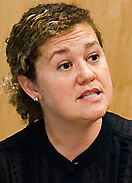Science on Tap to highlight breakthroughs that might change what it means to be human
February 16, 2015
 |
WEST LAFAYETTE, Ind. - Purdue University biomedical engineering professor Jenna Rickus will headline the next Science on Tap with a discussion about advancements in biomedical science and engineering that may redefine what it means to be human in the future.
The talk, titled "Humans 2.0: Will My Grandkids Be Cyborgs?" is at 6 p.m. Thursday (Feb. 19) in the upstairs of Lafayette Brewing Company, 622 Main St., Lafayette.
The informal lecture, which is free and open to those 21 and older, is sponsored by the Weldon School of Biomedical Engineering and Discovery Park.
Rickus, whose work spans agricultural, biomedical and food safety applications, cites several areas of research in her discussion of the growing biomedical field, including neuroengineering, cell transplantation, tissue engineering, synthetic biology and nanotechnology.
"These relatively new fields of research are all growing, and a few are on the verge of major breakthroughs that will revolutionize medicine and change how we see the human body," Rickus said. "These advancements may even change what it means to be human."
In the talk, Rickus will discuss how close today's technologies come to realizing the fantastical future that science fiction has dreamt up. "It gives rise to the probing question in the face of all this innovation: Could reality look like something we haven't even imagined yet?" she said.
Rickus graduated from Purdue in 1995 with degrees in agricultural and biological engineering and biochemistry. She worked as a research engineer at Kraft Foods for 2 1/2 years before returning to graduate school at UCLA, where she received her doctoral degree in neuroengineering.
The Rickus research group is focused on biofunctional materials for sensing and actuating living cells, tissues and organisms. Current projects include cell coatings to enable cell transplantation therapy for Type 1 diabetes, nano-biosensors to measure normal and pathological neuronal activity, a biosensor nano-satellite system (SporeSat2) to measure ion flux in plant cells during germination in microgravity, and 3-D engineered brain-like materials to study brain tumor invasion and treatment resistance.
She also is researching how to model and control the neurotransmitter release at a single cell level, hand-held implanted fiber-optic sensors for studying muscle metabolism, and biology-inspired hybrid nano-composite biomaterials to control neuronal fate and function.
Rickus co-founded and currently co-leads the Physiological Sensing Facility, a laboratory in Discovery Park's Bindley Bioscience Center, operating at the interface of bionanotechnology, microtechnology and bioscience to engineer new tools for studying and controlling living systems.
Since joining Purdue's faculty in 2003, Rickus has taught courses on nonlinear dynamics and chaos in biological systems, biosensors and quantitative cell biology.
Science on Tap, led by graduate students David Welkie, Anju Karki and Nelda Vazquez, provides Purdue faculty and collaborating researchers the opportunity to share research activities in an informal setting with presentations that are designed to appeal to a more general audience. Attendance at the monthly event has averaged 80 during the program's first four years.
Writers: Anna Schultz, 812-447-5229, schult70@purdue.edu
Phillip Fiorini, 765-496-3133, pfiorini@purdue.edu
Sources: Jenna Rickus, 765 494-1197, rickus@purdue.edu
David Welkie, 765-494-0455, dwelkie@purdue.edu
Nelda Vazquez, nvazque@purdue.edu
Anju Karki, 765-494-0455, akarki@purdue.edu

